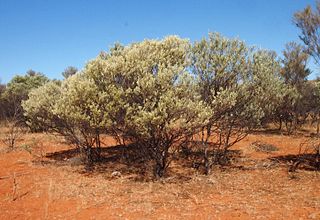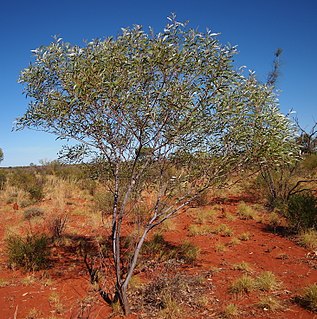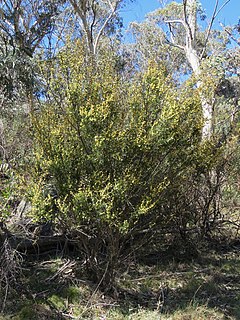
Acacia cuthbertsonii is a perennial shrub or tree native to arid parts of inland and north western Australia.

Acacia acradenia, commonly known as Velvet Hill wattle and silky wattle, is a shrub or tree belonging to the genus Acacia and the subgenus Juliflorae. It is native to northern and central Australia. The Indigenous Australian group the Nyangumarta peoples know it as walypuna the Alyawarr call it ampwey, the Jaminjung and Ngaliwurru know it as Mindiwirri, the Jaru as binbali or gundalyji, the Kaytetye as ampweye or arwele and the Warlpiri as ngardurrkura.

Acacia conjunctifolia is a shrub belonging to the genus Acacia and the subgenus Juliflorae. It is native to parts of northern Australia.

Acacia drepanocarpa is a shrub belonging to the genus Acacia and the subgenus Juliflorae native to northern Australia.

Acacia hemsleyi is a tree or shrub belonging to the genus Acacia and the subgenus Juliflorae that is endemic to tropical parts of northern Australia.

Acacia laccata is a shrub belonging to the genus Acacia and the subgenus Juliflorae that is endemic to northern Australia.

Acacia limbata is a shrub belonging to the genus Acacia and the subgenus Juliflorae that is endemic across northern Australia.

Acacia oncinocarpa is a shrub or tree belonging to the genus Acacia and the subgenus Juliflorae that is endemic to northern Australia.

Acacia orthocarpa, also commonly known as Pilbara weeping wattle, needle-leaf wattle or straight-podded wattle, is a shrub or tree belonging to the genus Acacia and the subgenus Juliflorae that is endemic to tropical parts of northern Australia. The indigenous Nyangumarta peoples know it as yartupu.

Acacia thomsonii, commonly known as Thomson's wattle, is a shrub or tree belonging to the genus Acacia and the subgenus Juliflorae that native to parts of northern Australia.

Acacia wickhamii is a shrub belonging to the genus Acacia and the subgenus Juliflorae that is endemic to parts of northern Australia.

Acacia melleodora, commonly known as scented wax wattle, waxy wattle, honey wattle or honey scented wattle, is a shrub belonging to the genus Acacia and the subgenus Phyllodineae that is endemic to arid parts of central Australia.

Acacia validinervia also commonly known as nyalanyalara, nyala nyala, alumaru or blue wattle, is a shrub of the genus Acacia and the subgenus Phyllodineae endemic to arid areas of inland Australia.

Acacia phlebocarpa, also known as tabletop wattle, is a shrub of the genus Acacia and the subgenus Plurinerves and is native to northern Australia.

Acacia nana, also known as the small red-leaved wattle, is a shrub belonging to the genus Acacia and the subgenus Phyllodineae where it is endemic to eastern Australia.

Acacia semirigida, also known as stony ridge wattle, is a shrub or tree belonging to the genus Acacia and the subgenus Phyllodineae native to north eastern Australia.

Acacia siculiformis, commonly known as dagger wattle, is a shrub belonging to the genus Acacia and the subgenus Phyllodineae native to south eastern Australia.

Acacia cataractae is a shrub belonging to the genus Acacia and the subgenus Juliflorae that is native to northern Australia.

Acacia striatifolia is a shrub or tree belonging to the genus Acacia and the subgenus Juliflorae that is native to north eastern Australia.

Acacia torulosa is a shrub or tree belonging to the genus Acacia and the subgenus Juliflorae that is native to north eastern Australia.




















